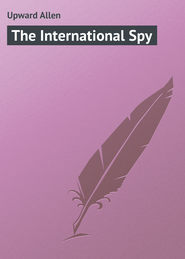По всем вопросам обращайтесь на: info@litportal.ru
(©) 2003-2024.
✖
The International Spy
Настройки чтения
Размер шрифта
Высота строк
Поля
It was melancholy to see the destinies of half Europe and Asia, and the lives of scores of thousands of brave men, hanging on the will of an irresolute young man, depressed by the consciousness of his own infirmity, and desperately seeking for some stronger mind on which to lean. Had I not been placed by my Polish sentiment in a position of antagonism to the Czardom, perhaps – but it is useless to indulge in these reflections.
One thing in the course of the interview struck me as having great significance for the future. I found that his majesty, who had entertained at one time a strong dislike of the German Emperor, a dislike not untinged with jealousy, had now completely altered his opinion. He spoke to me of Wilhelm II. in terms of highest praise, declared that he was under the greatest obligations to him for useful warnings and advice, said that he believed he had no truer or more zealous friend.
When I drove to the house of M. Petrovitch that evening I carried, carefully sewn between the inner and outer folds of my well-starched shirt-front, where no sound of crackling would excite remark, a sheet of thin note-paper covered in a very small handwriting with the text of the Czar’s letter to the ruler of Japan.
M. Petrovitch was not alone. Around his hospitable board he had gathered some of the highest and proudest personages of the Russian Court, including the Grand Duke Staniolanus, generally believed to be the heart and soul of the War Party. His imperial highness was well-known to be a desperate gambler, up to the neck in debts contracted at the card-table, and bent on recouping himself out of the wealth of Korea and Manchuria.
I was duly presented to this royal personage (whom I had met once before under widely different circumstances) in the character of a Peace Crusader, an emissary of the philanthropists of Great Britain.
At the dinner-table, where I found myself placed on my host’s left hand, while the Grand Duke was on his right, the conversation continued to be in the same strain. That Petrovitch believed me to be an English peace fanatic I did not believe any longer, but I could not tell if any, or how many, of the others were in his confidence.
As soon as the solid part of the feast was disposed of, Petrovitch rose to his feet, and after a bow to the Grand Duke, launched out into a formal speech proposing my health.
He commenced with the usual professions in favor of peace, spoke of the desire felt by all Russians to preserve the friendship of England, eulogized the work done by my friend the editor, and by other less disinterested friends of Russia in London, and wound up by asking all the company to give me a cordial welcome, and to send a message of congratulation and good-will to the British public.
Knowing as I did, that the man was a consummate rogue, who had probably invited me to his house in order to keep me under observation, and possibly to prevent my getting scent of the intrigues pursued by his friend and ally, Princess Y – , I was still at a loss to understand the reason for this performance.
I have learned since that an account of the proceedings, with abstracts from this hypocritical speech, was telegraphed to England, and actually found its way into some of the newspapers under the heading, “Peace Demonstration in St. Petersburg: No Russian Wants War.”
There was one of the guests, however, who made no pretense of listening with pleasure to the smooth speech of M. Petrovitch. This was a dark young man of about thirty, in a naval uniform. He sat scowling while his host spoke, and barely lifted his glass from the table at the conclusion.
A minute or two later I took an opportunity to ask the promoter the name of this ungracious officer.
“That?” my host exclaimed, looking ’round the table, “Oh, that is Captain Vassileffsky, one of our most distinguished sailors. He is a naval aide-de-camp to the Czar.”
I made a note of his name and face, being warned by a presentiment which I could not resist that I should come across him again.
The champagne now began to flow freely, and as it flowed the tongues of many of the company were unloosed by degrees. From the subject of peace the conversation passed rapidly to the possibilities of war, and the Japanese were spoken of in a way that plainly showed me how little those present understood the resolution and resources of the Island Empire.
“The Japanese dare not fire the first shot and, since we will not, there will be no war,” declared my left-hand neighbor.
“The war will be fought in Japan, not in Manchuria,” affirmed the Grand Duke with a condescending air. “It will be a case of the Boers over again. They may give us some trouble, but we shall annex their country.”
M. Petrovitch gave me a glance of alarm.
“Russia does not wish to add to her territory,” he put in; “but we may find it necessary to leave a few troops in Tokio to maintain order, while we pursue our civilizing mission.”
I need not recount the other remarks, equally arrogant.
Abstemious by habit, I had a particular reason for refraining from taking much wine on this night. It was already past nine o’clock, the train for Moscow, which connected there with the Siberian express, started at midnight, and I had to be at the police bureau by eleven at the latest to make the changes necessary for my disguise.
I therefore allowed my glass to remain full, merely touching it with my lips occasionally when my host pressed me to drink. M. Petrovitch did not openly notice my abstinence, but presently I heard him give an order to the butler who waited behind his chair.
The butler turned to the sideboard for a moment, and then came forward bearing a silver tray on which stood a flagon of cut-glass and silver with a number of exquisite little silver cups like egg-shells.
“You will not refuse to taste our Russian national beverage, Mr. Sterling,” the head of the War Syndicate said persuasively, as the butler began filling the tiny cups.
It was a challenge which I could not refuse without rudeness, though it struck me as rather out of place that the vodka should be offered to me before to the imperial guest on my host’s right.
The butler filled two cups, M. Petrovitch taking the second from the tray as I lifted the first to my lips.
“You know our custom,” the financier exclaimed smilingly. “No heeltaps!”
He lifted his own cup with a brave air, and I tossed off the contents of my own without stopping.
As the fiery liquor ran down my throat I was conscious of something in its taste which was unlike the flavor of any vodka I had ever drunk before. But this circumstance aroused no suspicion in my mind. I confess that it never occurred to me that any one could be daring enough to employ so crude and dangerous a device as a drugged draft at a quasi-public banquet, given to an English peace emissary, with a member of the imperial family sitting at the board.
I was undeceived the next moment. Petrovitch, as soon as he saw that my cup had been emptied, sat down his own untasted, and, with a well-acted movement of surprise and regret, turned to the Grand Duke.
“I implore your pardon, sir. I did not ask if you would not honor me by taking the first cup!”
The Grand Duke, whom I readily acquitted of any share in the other’s design, shrugged his shoulders with an indifferent air.
“If you wish your friends to drink vodka, you should not put champagne like this before us,” he said laughing.
Petrovitch said something in reply; he turned and scolded the butler as well, I fancy. But my brain was becoming confused. I had just sufficient command of my faculties left to feign ignorance of the true situation.
“I am feeling a little faint. That pâté” – I contrived to murmur.
And then I heard Captain Vassileffsky cry out in an alarm that was unmistakably genuine – “Look out for the Englishman! He is swooning” – and I knew no more.
CHAPTER VI
DRUGGED AND KIDNAPPED
My first thought, as my senses began to come back to me, was of the train which was due to leave Petersburg for Moscow at midnight.
I clutched at my watch, and drew it forth. The hands marked the time as 9.25. Apparently I had not been unconscious for more than a few seconds.
My second glance assured me that my clothes were not disarranged. My shirt-front, concealing the Czar’s autograph letter, was exactly as when I sat down to the table.
Only after satisfying myself on these two points did I begin to take in the rest of my surroundings.
I was resting on a couch against the wall in the room where we had dined. My host, the head of the Manchuria Syndicate, was standing beside me, watching my recovery with a friendly and relieved expression, as though honestly glad to see me myself again. A servant, holding in his hand a bottle which appeared to contain sal volatile, was looking on from the foot of the bed, in an attitude of sympathetic attention. The other guests had left the room, and the state of the table, covered with half-filled glasses and hastily thrown down napkins, made it evident that they had cleared out of the way to give me a chance to come to.
The cold air blowing over my forehead told me that a window had been opened. A Russian January is not favorable to much ventilation. As a rule the houses of the well-to-do are provided with double windows, which are kept hermetically sealed while the rooms are in use. The fact that the dining-room was still warm was sufficient proof that the window could not have been opened for more than the briefest time.
It was a singular thing that, in spite of these assurances that my swoon had been an affair of moments only, I was seized by an overmastering desire to get away from the house immediately.
I heard M. Petrovitch exclaim —
“Thank Heaven – you are better! I began to be afraid that your seizure was going to last. I must go and reassure my guests. The Grand Duke will be delighted to hear your are recovering. He was most distressed at the attack.”
I sat upright with an effort, and staggered to my feet.
“I am ashamed to have given you so much trouble,” I said. “I can’t remember ever fainting like this before. Please make my excuses to his imperial highness and the rest of the company.”
“But what are you doing?” cried M. Petrovitch in dismay. “You must not attempt to move yet.”








